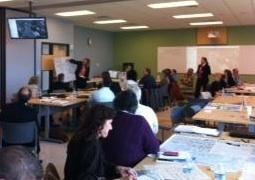
Bringing Walkable Urban Thoroughfares to Twinsburg, Ohio
John Norquist and partners train Twinsburg stakeholders on using the ITE Manual
Submitted on 05/2/2013. Tags for this image:On April 26, CNU hosted a technical assistance workshop aimed at guiding future development and design in the City of Twinsburg, Ohio, and higlighting the Designing Walkable Urban Thoroughfares manual as a tool for achieving that vision. The workshop was led by CNU President John Norquist, Board Member Marcy McInelly, and transportation engineer Lucy Gibson of Dubois & King in Vermont. Additional assistance was provided by Trey Akers, a LEED Certification Reviewer at the Green Building Council, and Bruce Donnelly, an urban planner based in Ohio.
The City of Twinsburg is currently in the process of updating its Comprehensive Plan and is seeking recommendations from the workshop to serve as a basis for redevelopment of its city center and several key corridors in a more walkable pattern that preserves the city's historic character. In 2009, the city lost its largest employer -- a Chrysler stamping plant -- but recently gained a LEED-certified Regional Academic Center for Kent State University. The city continues to see development pressure near its historic center, and has put a number of initiatives in place to ensure that future development is livable, sustainable and adds value.
Planning efforts in Twinsburg were led by Director of Community Planning and Development Larry Finch. Following the workshop, Finch commented:
[The] workshop was attended by a broad cross-section of stakeholders, planners, designers and agency personnel. The topic was one of timely importance to the City and to others in our region. The CNU staff and their consultants provided a great introduction to the subject matter and encouraged the attendees to look at streets in a more holistic, inclusive and context sensitive manner. The afternoon work group sessions encouraged creative ideas that will be considered as we proceed through the process of developing the City’s comprehensive plan.
The Twinsburg workshop was funded in part by the U.S. EPA's Office of Sustainable Communities under their Building Blocks for Sustainable Communities Program, via a grant to the Project for Public Spaces (PPS). The Building Blocks program funds quick, targeted assistance to communities that face common development problems. CNU provided assistance as part of their partnership in Livability Solutions. Materials from the workshop will be made available at www.cnu.org/streets/twinsburg.


